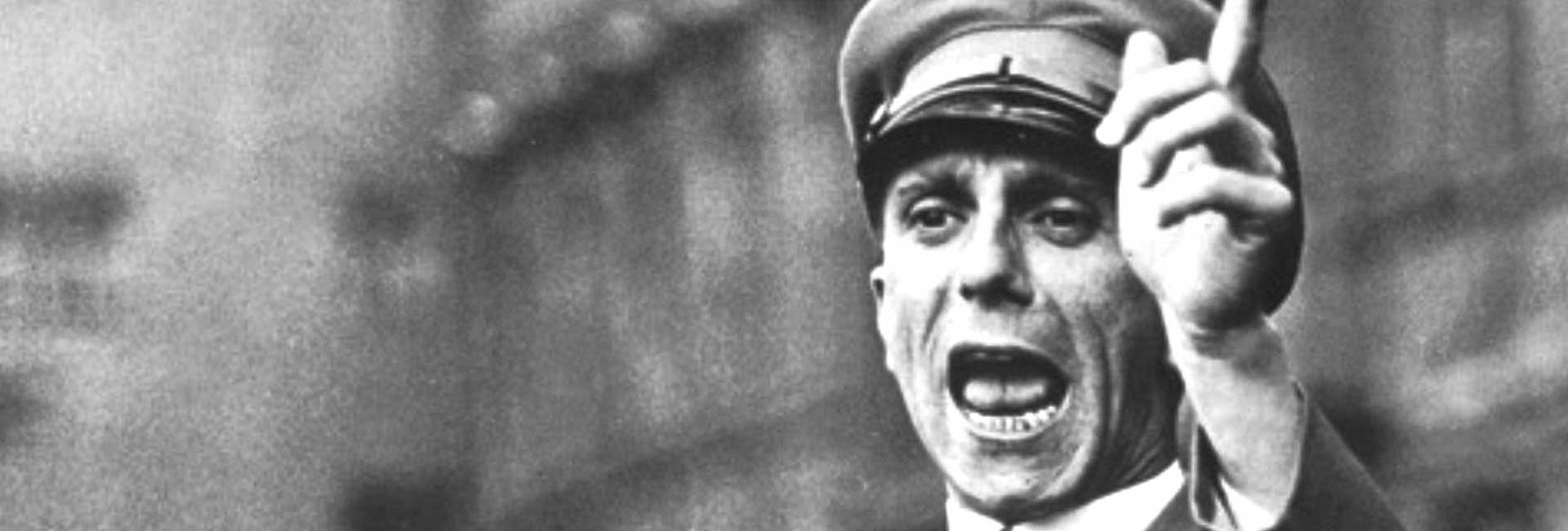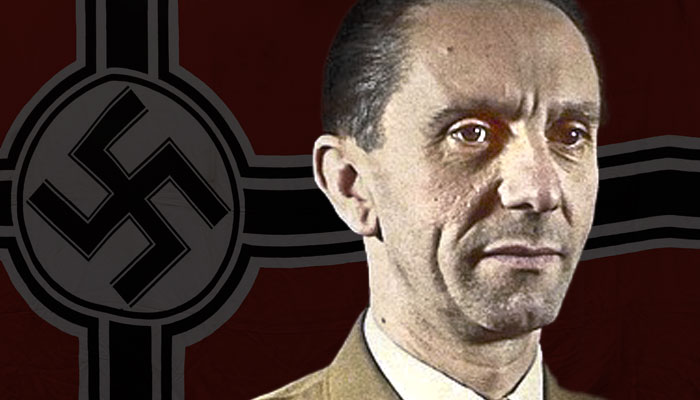
Life and death of Joseph Goebbels
Life and death of Joseph Goebbels, the facts
Paul Joseph Goebbels born in Rheydt Germany on October 29, 1897 and died in Berlin on May 1, 1945, was a German politician and publicist. He was the Minister of Public Information and Propaganda and eventually the last Reich Chancellor of Nazi Germany.
Education
Joseph Goebbels was a son of the German bookkeeper Fritz Goebbels and Maria Catharina Odenhausen, a blacksmith's daughter from Waubach in the Netherlands. He was rejected for military service in World War I because of a deformed foot. He studied literature and philosophy at various German universities and obtained his doctorate in Heidelberg in 1921 with a dissertation on the 19th-century Romantic writer Wilhelm von Schütz. During his PhD he wrote a novel entitled Michael and two plays: Blutsaat and Der Wanderer. Goebbels was never able to find a publisher for this work. One of the refusers, publishing house Ullstein, was owned by a German-Jewish businessman. This aroused anti-Semitic feelings among the formerly said to be 'neutral' Goebbels.
Acquaintance with Hitler
Goebbels tried in vain to find work as a journalist. Frustrated, he moved from Rheydt to Cologne, Berlin and then to Munich. In February 1924 the trial against Adolf Hitler began after his failed Bierkellerputsch. The trial received a lot of press coverage and served as a stage for Hitler and his political ideas. Goebbels was greatly impressed by Hitler and became a member of the NSDAP that year. He gained experience as a public speaker and turned out to have rhetorical and publicity talents. Goebbels began to spread the National Socialist message and tried to win people over to Hitler. He became the publisher of the Nazi magazine Völkische Freiheit. In his articles he mainly raged against the French occupation troops of the Rhineland, which had been stationed there since the First World War. He then also broke with the Catholic faith, much against the will of his parents.
Career within the NSDAP
In 1926 Goebbels was appointed Gauleiter of Greater Berlin by Hitler. In 1927 he published the magazine Der Angriff as the opposite of the then more dominant (internationally oriented) communism in Berlin. Goebbels explicitly supported the left and more socialist wing of the Nazi party in the late 1920s; like Gregor Strasser, he advocated a clearer mixing of (non-Marxist) socialism with popular nationalism. However, his own magazine Der Angriff became a formidable competitor of Strasser's magazine Berliner Arbeiterzeitung and he enjoyed his growing reputation as a rude propagandist. Goebbels was elected as a member of the Reichstag for the NSDAP in 1929. He became Reichsleiter für Propaganda of this party, gaining experience as a public speaker. After Hitler's seizure of power in 1933, he became Minister of Public Information and Propaganda. As such he gained more and more power and finally controlled all media: press, radio and film, as well as the art world. He became one of Hitler's closest associates.
Women
On December 19, 1931, he married the divorced Magda Quandt. She had many good social contacts. In 1936 Goebbels started an affair with a 22-year-old UFA movie star, the Czech Lída Baarová. Goebbels had had numerous affairs and would have more, but in this case he even considered divorcing Magda and taking Lida with him to Japan, where he would then become an ambassador. However, such a union of a well-known actress of Slavic, and therefore 'inferior', descent with the propaganda minister would embarrass the regime. Hitler intervened after two years and Lida was taken to Prague, where her mail and telephone were checked by the Gestapo. [3] The film Die Preußische Liebesgeschichte (1938) in which she played the leading role was banned. His erotic escapades earned Goebbels the nickname Babelsberg's buck (the place where the UFA studios were located).
Second World War
Goebbels did not make any military decisions himself. His job as Minister of Public Information and Propaganda was to keep morale high and to ensure that the civilian population stood and stood behind the war. As the war progressed, Hitler appeared in public less often and Goebbels increasingly became the voice of the government for the German people.
From 1942, when it was clear that a quick victory on the Eastern Front was no longer possible, nor against the Western Allies, because Hitler had even declared war on America (against the advice of Goebbels, Hermann Goering and other Nazi bosses), alienated Goebbels from Hitler. As a minister of public information, however, his qualities were undeniable, taking into account the nature of the regime he served. On February 18, 1943, shortly after the defeat of Stalingrad, he delivered an exalted speech in Berlin's Sportpalast, in which he presented the rhetorically intended question to the German population whether it wanted total war ("Wollt ihr den totalen Krieg?"). This was a markedly different message than before, which boiled down to the fact that cannons or butter could be produced. When the odds had turned for the Germans, his role as a propagandist was largely over and he was appointed Reich Plenipotentiary for all-out war. Goebbels was instrumental in thwarting the plot of July 20, 1944, and went on to become Hitler's closest ally again.
Towards the end of the war, Hitler convinced Goebbels to stay in Berlin in order to work on his myth formation. After Hitler's suicide, he refused to take over the leadership of the collapsed Nazi empire for the following reasons:
"Der Führer hat mir den Befehl gegeben, im Falle des Zusammenbruchs der Verteidigung der Reichshauptstadt Berlin zu verlassen und als führendes Mitglied an einer von ihm ernannten Regierung teilzunehmen. Zum erstenmal in meinem Leben muß ich mich kategorisch weigern, einem Befehl des Führers Folge zu leisten. Meine Frau und meine Kinder schließen sich dieser Weigerung an. Im anderen Falle würde ich mir selbst (...) für mein ganzes ferneres Leben als ein ehrloser Abtrünnling und gemeiner Schuft vorkommen, der mit der Achtung vor sich selbst auch die Achtung seines Volkes verlöre, die die Voraussetzung eines weiteren Dienstes meiner Person an der Zukunftsgestaltung der Deutschen Nation und des Deutschen Reiches bilden müßte".
Translation
"The Führer has ordered me, should the defense of the Reich capital fail, to leave Berlin and join a government appointed by him as a senior member. For the first time in my life I must categorically refuse an order from the Fuehrer. My wife and my children agree with this refusal, otherwise I would feel myself ... for the rest of my life a disgraceful deserter and common villain who, with his self-respect, would also have the respect of his people losses, which should be a prerequisite for my person's further services to the future of the German nation and the German Empire. "
Murder on family and suicide
As was stated in the last will of Adolf Hitler, Goebbels was appointed successor to Hitler as chancellor. In this position, Goebbels, as head of government, controlled the cabinet appointed by Hitler and was the second man in Germany, after Reich President Karl Dönitz, to whom he was accountable. Nevertheless, according to Goebbels, everything was lost and he decided, following Hitler, to commit suicide. On the evening of May 1, 1945, Joseph Goebbels had his children killed. Helmut Gustav Kunz, assistant to the chief physician of the Sanitätsverwaltung, administered a good dose of morphine to all children (Helga, Hilde, Helmut, Holde, Hedda and Heide). After the children were drugged, Ludwig Stumpfegger, Hitler's personal physician, and Magda, Goebbels' wife, broke a hydrocyanic acid capsule in each child's mouth, causing them to die.
Later that evening, Joseph and his wife committed suicide in the garden of the Reich Chancellery using a hydrocyanic acid capsule. An SS man had also been ordered to shoot two bullets into each body to make sure they were dead. After this, the bodies were burned, but due to the limited amount of gasoline, the bodies were only partly burned and were afterwards easily recognisable.

-
Born: October 29, 1897
-
Rheydt Germany
-
Died: May 1, 1945
-
Berlin, Germany
